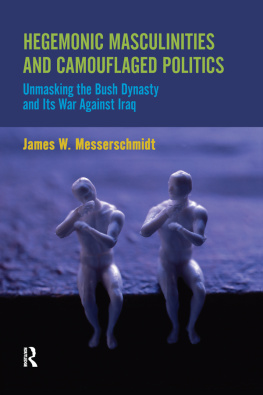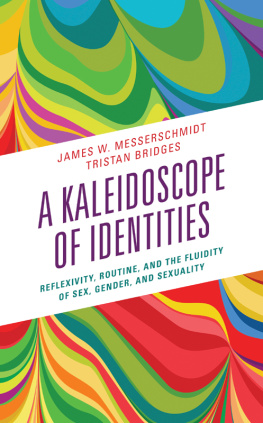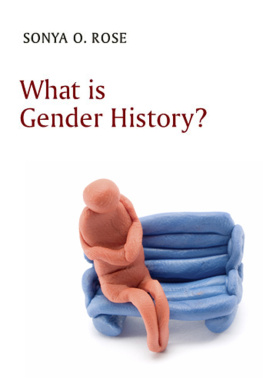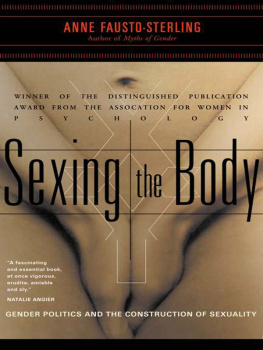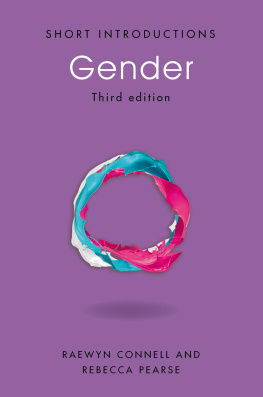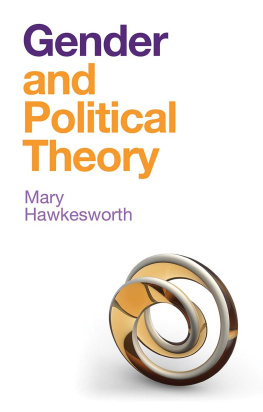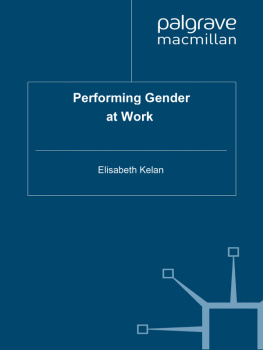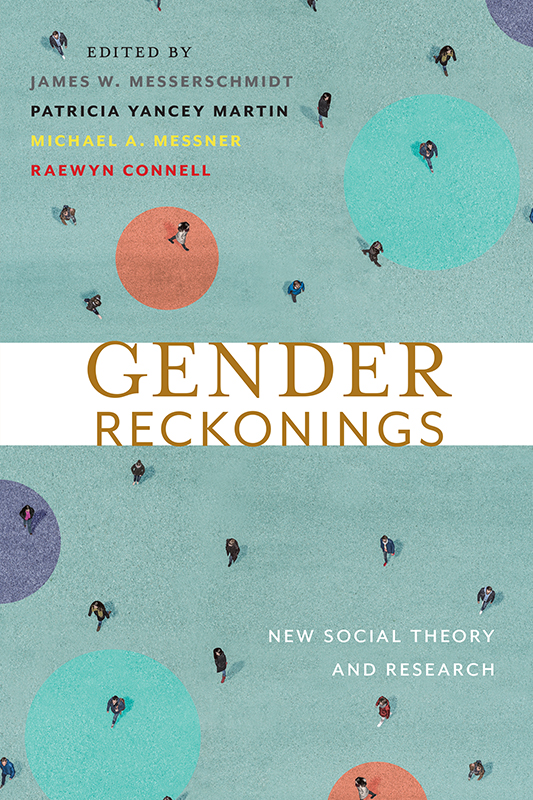
Gender Reckonings
Gender Reckonings
New Social Theory and Research
Edited by James W. Messerschmidt, Patricia Yancey Martin, Michael A. Messner, and Raewyn Connell

NEW YORK UNIVERSITY PRESS
New York
NEW YORK UNIVERSITY PRESS
New York
www.nyupress.org
2018 by New York University
All rights reserved
References to Internet websites (URLs) were accurate at the time of writing. Neither the author nor New York University Press is responsible for URLs that may have expired or changed since the manuscript was prepared.
ISBN: 978-1-4798-9714-8 (hardback)
ISBN: 978-1-4798-0934-9 (paperback)
For Library of Congress Cataloging-in-Publication data, please contact the Library of Congress.
New York University Press books are printed on acid-free paper, and their binding materials are chosen for strength and durability. We strive to use environmentally responsible suppliers and materials to the greatest extent possible in publishing our books.
Manufactured in the United States of America
10 9 8 7 6 5 4 3 2 1
Also available as an ebook
Contents
Myra Marx Ferree
James W. Messerschmidt and Michael A. Messner
Kristen Schilt
Raka Ray
Mara Viveros Vigoya
Joya Misra
Stevi Jackson
Christine L. Williams and Megan Tobias Neely
Barbara Poggio
Yvonne Benschop and Marieke van den Brink
Kopano Ratele
Gul Ozyegin
Tristan Bridges and C. J. Pascoe
Barbara J. Risman, Kristen Myers, and Ray Sin
Judith Lorber
Mimi Schippers
Raewyn Connell
An edited volume such as this necessarily invites much appreciation and gratitude. First and foremost, we thank the contributors to this volume. They have all come together to both collectively celebrate the 30th anniversary of the publication of Gender and Power, and to offer insightful new social theory and research. We salute their wisdom and visionthis book would never have been written without them. Second, colleagues were kind enough to provide formal reviews of the entire manuscript and to impart valuable criticisms and recommend important changes. Their advice and guidance have certainly transformed this book into a higher quality publication than it otherwise would have been. Third, we wish to extend our appreciation to the entire staff at New York University Press, but especially to Ilene Kalish (Executive Editor), who was graciously and wholeheartedly supportive of this work from its inception, and to Caelyn Cobb (assistant editor), Dorothea Stillman Halliday (managing editor), and John Raymond (copy editor). Fourth, we are grateful to Madeleine Pape for her excellent preparation of the index.Finally, we extend warm hugs to each other. We have been treasured colleagues and valued friends for many years. Working on this volume together has been a stimulating, lovely, heartfelt, and collaboratively intellectual relationship from beginning to end.
The Editors
This book is about why gender matters, how gender relations work, and where the gender order is headed. We think the time has arrived for a fresh look at these questions, and a critical rethinking of current theory. The book is a celebration of history, a window on the present, and, we hope, an inspiration going forward.
The chapters of this book are written by social scientists. Questions about gender concern our bodies, but not bodies alone; identities, but not identities in a vacuum; and relationships, but not just face-to-face relationships. Powerful social processes are also involved. Corporations, markets, governments, the mass media, and social movements are actors on the gender scene. On a world scale, gender is woven into the history of empire and modernity, into the current neoliberal economy, and into the daily conflicts that make the shocking headlines in our news feed.
Understanding gender, its inequalities and violence, as well as its homeliness and pleasures, therefore requires a social perspective. Contemporary social science has resources for this. But a lot of what passes for social analysis of gender is conceptually weak. Hasty gestures toward gender norms, social construction, or stereotypes do not explain much. In this book we work with more powerful tools and hope to understand a great deal more. Our emphasis is twofold: celebrating one of the most significant books in the history of gender studies and advancing new social theory and research.
Celebrating Gender and Power
The publication of Gender Reckonings marks a prominent occasion: the thirtieth anniversary of Raewyn Connells Gender and Power: Society, the Person, and Sexual Politics, which analyzed the social reality of gender with means available in the 1980s, in the immediate aftermath of the emerging womens liberation and gay liberation movements. A great deal has changed since then, and building on Connells work, Gender Reckonings takes up the challenge of social analysis of gender in a new historical context.
As mainstream theory in the global North shifted from the concept of patriarchy to the concept of gender, and from structure to practice, Gender and Power found a receptive audience. Published in 1987, this book had its origins in the historical experience of the remote settler-colonial society of Australia, marked by dependence and cultural unease, a continuing indigenous presence, deep-seated race and gender hierarchies, state-centered class politics, and reformist optimism. In this environment Australian feminism became deeply involved in institutional struggles, especially in the labor movement, the school system, and the welfare state. Yet it was also deeply influenced by North American and European thought.
So Gender and Power, though it had a local subtext, was framed as an intervention in an international debate. Its first section set out to refute the popular models of gender that had led to an intellectual and political impasse: biological essentialism, sex role theory, and all categorical approachessuch as the theory of patriarchywhere women and men were seen as blocs sitting opposite each other. These models prevented an understanding of social process and historical change.
In their place, Gender and Power offered an account of gender as simultaneously social practice and social structure; as linked with, but not determined by, reproductive bodies. In place of single-cause explanations of gender inequality, the book treated gender relations as composed of three substructurespower, production, and cathexis. It tried to map the structure of gender relations in the whole society, the gender order; and in specific institutions and milieux, their gender regimes. Structure and practice are not opposed; they are in a sense transformations of each other through time. Gender and Power adapted the existentialist idea of people encountering, and transforming, situations.
Structure was conceptualized as neither static nor fixed, although the label may imply that it is; we think of buildings, tables, and sidewalks as structures. In social life, structure is in continuous flux because practiceor the active constitution of social lifeis in play. Gender was thus understood as fundamentally historical, made and remade through historical time. Each of the three substructures had its own tendencies toward crisis and change.
Picking up the concerns of feminist psychology and gay liberation,
Next page


